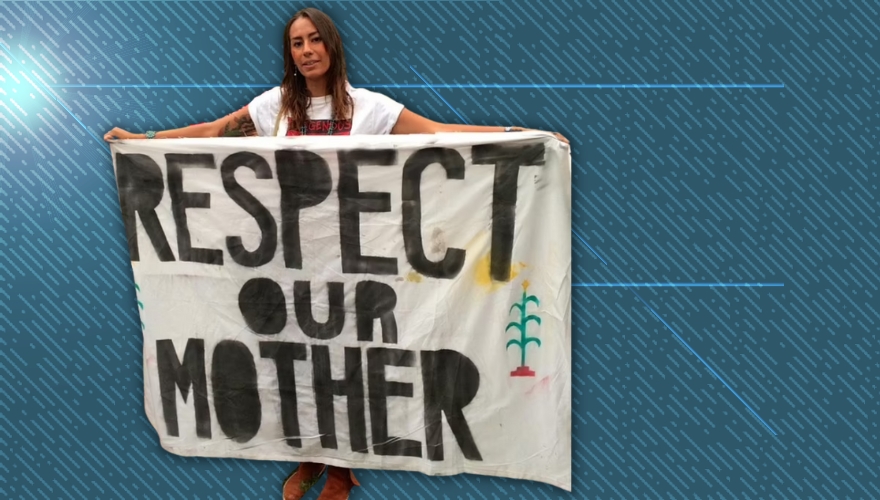A professor at the University of California-Berkeley, and noted "Native American" activist, is under fire after admitting that she is actually white.
Sociology professor Elizabeth Hoover has been facing calls for her resignation since last year and has now admitted to having "received academic fellowships, opportunities, and material benefits that I may not have received had I not been perceived as a Native scholar."
Hoover claims that her relatives had told her that her grandmothers were members of the Mohawk and Mi'kmaq tribes — a claim that other activists and Native American scholars have questioned for over a year."I am a white person who has incorrectly identified as Native my whole life, based on incomplete information," Hoover admitted in a post to her website on Monday. "In uncritically living an identity based on family stories without seeking out a documented connection to these communities, I caused harm. I hurt Native people who have been my friends, colleagues, students, and family, both directly through fractured trust and through activating historical harms. This hurt has also interrupted student and faculty life and careers. I acknowledge that I could have prevented all of this hurt by investigating and confirming my family stories sooner. For this, I am deeply sorry."
She continued, "In my twenties and thirties, I lived in different Native communities, where I knew I did not have the breadth and depth of connection that these folks had to Native family, history, and culture. At the time I wrongly felt that my distant connection was enough for me to claim a Native identity alongside them. This identity guided the types of research and community work I carried out, and the communities I sought to be part of—communities who may or may not have welcomed me in the same way had I identified as white."
Hoover said she was questioned about her Indigenous identity when she began her first assistant professor job at the university in 2020. She wrote off the concerns as "petty jealousy" and responded with her family lore that she claims had been handed down to her. Despite being a professor and devoting her life to Native American research and activism, she admits she did not dig into her family's claims."Identifying as a Native person gave me access to spaces and resources that I would not have otherwise, resources that were intended for students of color," the professor admitted. "Before taking part in programs or funding opportunities that were identity-related or geared towards under-represented people I should have ensured that I was claimed in return by the communities I was claiming. By avoiding this inquiry, I have received academic fellowships, opportunities, and material benefits that I may not have received had I not been perceived as a Native scholar. My current position was an open call for scholars that focus on environmental justice or food justice and was not part of the Native American Studies cluster hire, which was launched subsequently and is ongoing. Though my current position is separate from the Native American Studies cluster, I recognize that I harmed those who advocated for me and trusted me as an advisor, educator, and community member."
Hoover additionally admitted that she has been in ceremonial and social spaces that are typically reserved only for Native American people.
In November 2022, nearly 400 students and colleagues signed an open letter calling for Hoover to step down and apologize for being a "Pretendian."
"Elizabeth Hoover (Pretendian) is one of many settlers in academia who claim Indigeneity based on unverified family lore and has marketed this identity for personal gain, acquiring both fellowships and faculty positions," the collective statement began.
The letter accused Hoover of not being honest or straightforward about her identity and her lack of connection to Kahnawake Mohawk or Mi’kmaq communities.
"Instead," the letter stated, "she adorned herself in Indigenous apparel and regalia signifying to everyone the credibility of her Indigeneity. What she lacked in genuine cultural connection, she made up for in earrings, shirts, and dresses with Indigenous designs. She engaged in an essentialized performance of Indigeneity, allowing others to make assumptions rather than ask questions."
To rectify this, the letter demanded that Hoover "stop cosplaying with Indigenous jewelry, fashion, regalia, or any other performative mechanisms that seek to confuse her audience and subsequently silence questions of authenticity."
In addition to calling for Hoover to be fired, the letter demands monetary compensation to the tribes she claimed to be part of and that she "repatriate gifted cultural or sacred items given to her previous persona unless explicitly informed otherwise."
Hoover has not indicated any intention of leaving her position or ceasing giving speeches. However, she wrote that she is "working with restorative justice facilitators to better understand how members of the UC Berkeley campus community have felt harmed and betrayed, and ways I can work to meaningfully make amends for this."
The professor said that proceeds from her talks and book sales will go to Native farm, food sovereignty, and educational programs. She has also "put away" her "dance regalia, ribbons skirts, moccasins, and Native jewelry."
According to her website, Hoover has published several books based on collaborations with tribal communities across the United States about "Native American food sovereignty and seed rematriation; environmental reproductive justice; the social and cultural impacts of fish advisories; and tribal citizen science and community based participatory research." Her first book was titled, "The River is In Us; Fighting Toxics in a Mohawk Community."
UC Berkeley said in December that it didn’t plan to remove her from her position, according to a report from the Press-Telegram. When the paper inquired again after her admission, a representative for the institution said they could not comment on personnel matters.
The paper reports that Mohawk scholar Audra Simpson, an anthropology professor at Columbia, has argued that Hoover’s professional history shows she “lacks the requisite ethical and academic integrity to be a professor or a social scientist.”

